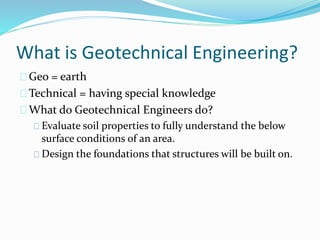The Ultimate Guide To Geotheta
The Ultimate Guide To Geotheta
Blog Article
7 Easy Facts About Geotheta Described
Table of ContentsThe Best Strategy To Use For GeothetaGeotheta Things To Know Before You BuyIndicators on Geotheta You Should Know8 Simple Techniques For Geotheta
They team up with civil engineers, architectural designers, designers, and other specialists to incorporate geotechnical considerations right into the total project layout and building and construction process. This calls for effective teamwork, coordination, and communication to make sure that the geotechnical elements align with the job purposes and meet regulative demands.Mining & Products Design: Principles of boring, infiltration rates, and factors impacting the option of exploration method. Characteristics of explosives, shooting systems and blast patterns. Blowing up methods in surface area and underground operations. Special blowing up methods at excavation boundaries. Vibration and noise control. Mechanical and continuous approaches to fragmentation, including longwall shearing and fullface boring.
Modelling of fragment and particle size circulations; comminution as a transfer feature. Comminution technology: crushing, grinding, size category. Integrated analysis of fragmentation and comminution procedures. Supplied by: Mining & Products Design.
The smart Trick of Geotheta That Nobody is Discussing
Bachelor's degree programs in civil, geotechnical, geological, and ecological design commonly last four years and consist of basic education and learning programs in English, social scientific research, and the liberal arts, along with programs in innovative maths, structural geology, and liquid mineralogy. (https://geotheta.start.page)
Geotechnical engineering involves the assessment of the soil and rock problems at a specific site, and their effects for the development of that site. As most structures count on the ground for assistance, it lacks surprise that a thorough understanding of the ground problems, and the viability of structure systems, are essential to the long-lasting stability and efficiency of the building or structure.
Specialising in the investigation of geological formations and ground behavior, geotechnical designers perform clinical examinations and screening to understand the impact these geological developments may have on the layout and building of structure, civil and infrastructure projects. This expertise is crucial for the layout and construction of buildings, roadways, passages, dams, bridges, and water and sewer system.
The geotechnical group at Douglas Partners consistently talk to architects, layout designers, designers, and home builders to make recommendations on layout and development propositions to make sure that the developed frameworks are appropriately developed for the ground conditions. As an example, the layout of footing systems needs to consider the weight of the structure, the capability of the ground to support that weight along with activity tolerances and reliable building and construction.
The Geotheta PDFs
This job is considerably streamlined by the use our Douglas Map geospatial platform which makes this details readily available in an easy to make use of internet internet browser user interface. A geotechnical engineer will guide the drilling of boreholes and examination pits to gather soil and various other examples, and likewise examine surface area attributes and ground exposures to create a geotechnical model of the subsurface problems.
Depending upon the project kind and ground problems ran into, lab testing might among other things analyze stamina, compressibility, reactivity and/or permeability of soil and rock samples. Hereafter information is gathered and collated, the results are made use of for a geotechnical model of the website, which is usually offered as areas throughout the site.

A geotechnical investigation naturally can only evaluate the ground conditions at the areas pierced or excavated. All-natural variations in dirt and rock conditions can take place throughout a site and between test locations. It is for that reason great practice that the geotechnical engineer be retained throughout construction of the task to give on-site verification that the ground conditions experienced follow the assumptions and recommendations provided in the geotechnical investigation record.
Rumored Buzz on Geotheta
Geotechnical designers use their thorough understanding of dirt and rock to analyze risk and solve issues on varied facilities projectsGeotechnical engineering is a specialist branch of civil engineering which takes a look at the behavior of earth materials and the application of soil and rock mechanics. Consulting Engineer. As a geotechnical engineer, you will assess the physical, mechanical and chemical properties of soil and rock in order to create structures, keeping structures and earthworks
Geotechnical design is carefully connected to and overlaps with, both design geology and ground design - https://www.evernote.com/shard/s342/sh/0ddde0a2-417b-669e-3d11-8f53bf2073ba/dxCfPcosgpFcDl9WAXonEVeNbxWt1i_y0aMcgTcK_KXcXyxfIS3apQYAgA. It's possible to be experts in geotechnics or benefit a geotechnical business however be called a design rock hound or a ground engineer. As a geotechnical designer, you'll need to: develop and maintain relationships with customers and other professionals associated with the website, throughout each projectmaintain security requirements on site bear in mind expense ramifications when you make recommendationsstudy geological maps and aerial pictures from a series of resources and from different time periodsexamine building plans to additional hints see exactly how feasible they are based upon your understanding of the siteinvestigate threats or geological dangers for the sitesearch for ecologically delicate functions, such as landfill begin to create valid and expository ground modelsplan area investigationsdrill and analyse examples of bedrock, dirt, groundwater and added products manage other specialists on sitesolve technological concerns as they develop, such as unanticipated structures at drill sitesmonitor conditions throughout and after construction to make sure structures are secure in the brief and long termadding information accumulated on site to your first researchcreating geotechnical calculations, illustrations, and 2 or three-dimensional computer system designs translating the datamaking suggestions about the recommended usage of the site

Report this page